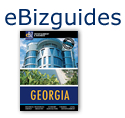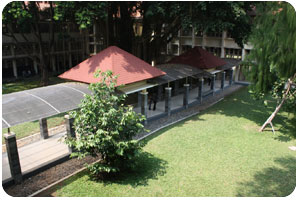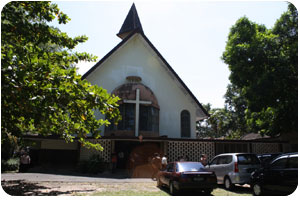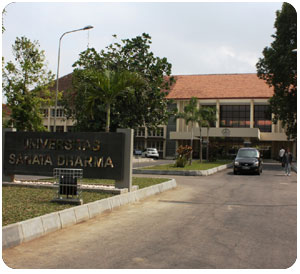|
History
Sanata Dharma Teacher Training College (1955-1958)
Although Sanata Dharma began to be recognized as a university in April 1993, its history dates back to 1955 when Catholic Priests, particularly those of the Order of the Society of Jesus in central Java and lay intellectuals decided to found a teacher-training college. By then, the Order had run a one-year diploma course in Education under the de Britto Foundation in Yogyakarta managed by Father H. Loeff, S.J. and in English under the Loyola Foundation in Semarang by Father W.J. van der Muelen, S.J. and Father H. Bastiaanase, S.J.
Later, with the support of the Congregation de Propaganda Fide, Father Kester, the then Superior of the Jesuit Missionaries, united these courses into a higher learning institution and so was born Sanata Dharma Teacher Training Institute on October 20, 1955 and was officially inaugurated by the Indonesian government on December 17, 1955. At the onset, Sanata Dharma had 4 departments: Education, English, History, and Natural Sciences. The superior of the Jesuit mission appointed Father Nicolaus Driyarkara, S.J. as the Dean and Father H. Loeff as the Vice Dean.
The name “Sanata Dharma” was coined by Father K. Looymans, S.J., who was then an officer in the Department of Education and Culture at the Office of the Indonesian Bishops. “Sanata Dharma” means “the true dedication” or “the real service”. The dedication and the service have been devoted to the nation and the church (Pro Patria et Eclessia)
Faculty of Teacher Training of Catholic University of Indonesia (1958-1965)
In November 1958 Sanata Dharma was renamed Sanata Dharma Faculty of Teacher Training and Education and was a member of the Association of Catholic Universities in Indonesia.
Sanata Dharma Institute of Teacher Training and Education (1965-1993)
Being independent and autonomous, in 1965 this Faculty is changed into Sanata Dharma Institute of Teacher Training and Education. Since 1979 this institute had run a Bachelor and Diploma programs in Mathematics, Physics, Indonesian, English, and Social Science.
Sanata Dharma University (1993 to date)
Finally, to meet the demands and needs of the community and the progress of science and technology, on April 20, 1993, the Sanata Dharma Institute of Teacher Training and Education was developed into Sanata Dharma University. With this development Sanata Dharma University is expected not only to improve the system of teacher training but also to fully participate in the development of science and technology.
As a university, Sanata Dharma has been challenged to broaden its study programs. While maintaining Teacher Training Programs in the Faculty of Teacher Training and Education, the university opened new faculties. Currently Sanata Dharma runs 8 faculties with 25 undergraduate study programs, 3 graduate programs, and 2 professional education program, and some certified courses. Since then, Sanata Dharma has experienced a lot of progress and development, such as the construction of physical facilities (buildings, laboratories, libraries, and a student center), the upgrading of administration (information system, management, and their supporting units, such as bureaus, centers, or institutions), and the improvement the academic quality, research, instruction, and social service to the community.
Vision
Sanata Dharma University has been established to participate in the task of protecting and improving the human dignity through combining academic excellences and human values. This goal is
• manifested in the academic and objective search of truth and development of the younger generation
• based on national and human values and Ignatian spirituality: to become men/women for and with others, personal care, the spirit of excellence, and the spirit of dialogue.
Mission
Sanata Dharma University has been founded as an institution which
• integrate academic excellences and human values
• upholds critical thinking, academic freedom, human values and dialogues
• develops students’ intellectual, moral, emotional, and spiritual qualities
• educates the students to be integrated, critical, mature, and socially-minded
• provides services to the community
• produces professional educational personnel.
Location:
• Campus I and II (Faculty of Teacher Training and Education, Facultry of Letters, Faculty of Economics, Graduate Progams, Library, and Adminstrative Building): Affandi Street, Gejayan, Mrican Yogyakarta
• Campus III (Faculty of Scince and Technology, Faculty of Psychology, and Faculty of Pharmacy): North Ring Road, Paingan, Maguwoharjo, Depok, Sleman, Yogyakarta.
• Campus IV (Faculty of Theolgy): Kaliurang Street Km 7, Kentungan, Sleman, Yogyakarta
• Campus V (Department of Catholic Religion): Ahmad Jazuli Street No 2 Kotabaru, Yogyakarta
• Campus VI (Department of Elementary School Education) Tantular Street Pringwulung, CC, Depok, Sleman, Yogyakarta
Faculties and Study Programs
I. Faculty of Teacher Training and Education
Sanata Dharma University remains seriously committed to the training of future school personnel and in particular, teachers. This commitment is supported by valuable assets of long, successful experience in the education of pre-service teacher trainees. The programs are:
1. Department of Guidance and Counseling
This program educates future counselors who are competent in running guidance and counseling services to individuals and groups, both in and outside schools, with the objective that the clients understand themselves and their environments in order to be able to make wise and responsible choices and are able to adjust themselves adequately. They are expected to be able to give training, such as personality development, leadership, communication skill, youth guidance.
2. Department of English Language Education
This program educates future teachers who actively master English, spoken and written, possess teaching skills, and are able to design English education programs in various courses. In addition, the graduates are expected to be able to work in various non-educational fields, such as publishing, tourism, businesses, secretarial affairs and entrepreneurship.
3. Department of Indonesian and Local Languages and Literature Education
This program prepares the future school personnel to actively master the Indonesian language, both written and spoken, to teach the language, and to work in the journalistic field.
4. Department of Economics Education
This program educates prospective teachers to master economics and management sciences in order to be able to teach them to their future students and also to work in various business enterprises.
5. Department of Accounting Education
This program produces educational personnel to master accounting principles and systems in order to be able to teach them to their future students and to work in business enterprises requiring accounting skills.
6. Deparment of History Education
This program educates teaching personnel to master history and its methods in order to be able to teach them to their students and to work in various fields such as research, journalism, publishing and tourism.
7. Department of Physics Education
This program educates educational scholars to master principles of physics and teach them to their future students.
8. Department of Mathematic Education
This program educates teaching personnel to master mathematics and teach it with or without computer programs.
9. Department of Biology Education
This program is aimed at preparing prospective teachers to master Biology closely connected with Ecology and its related issues so that their future students will learn Biology in a more intagrated way
10. Department of Catholic Religion Education
This program educates future teachers of the Catholic religion, both in and outside schools.
11. Department of Elementary School Teacher Education
This non-degree, two-year diploma program provides in the formation of competent teachers for elementary schools.
II. Faculty of Letters
Programs in the Faculty of Letters are:
1. Department of English Language and Literature
This program is to produce graduates who master English, both spoken and written, are knowledgeable in the English language, literature, and culture and are able to professionally utilize them in business, public relations, translation, journalism, editing, and secretarial affairs.
2. Department of Indonesian Language and Literature
This program is to prepare graduates who master Indonesian, both spoken and written, are knowledgeable in the Indonesian language, literature, and culture and are able to evaluate Indonesian literary works and to professionally utilize them in various art expressions, publishing, and journalism.
3. Department of History
This program is to educate graduates who master the methodology of historical research and its development in order to be able to conduct social, cultural, economic and political analysis and are able to work in various professions related to history, such as historical research, historiography, journalism, archival maintenance, care of historical remains and historical tourism.
III. Faculty of Economics
Programs in the Faculty of Economics (all accredited)
1. Department of Management
This program is meant to produce scholars competent in managing and developing financial activities, marketing, human resource, business operations and strategies for both profit and non-profit organizations.
Concentration:
1. Marketing Management
2. Human Resource and Strategic Management
3. Operation Management
4. Financial Management
2. Department of Accounting
This program is meant to prepare graduates who master accounting sciences with a strong foundation of economics in order to be able to present, analyze, and audit financial reports for both internal and external purposes.
Concentration:
1. Auditing
2. Information System and Entrepreneurship
3. Management Accounting
4. Financial Accounting
5. Public Sector and Governmental Accounting
3. Accountant Profession
IV. Faculty of Psychology
The program in this faculty is to produce professional helpers who
• master six basic skills in psychology: relation, intervention, research and evaluation, consultation and education, management, and supervision
• possess the attitude of dialogue
• are competent in developing and applying the skills and principles of psychology
As basic and general undergraduate program, this program of includes six fields of psychology. They are:
• General and Experimental Psychology, focusing on the basic concept of human behavior and its research method
• Developmental Psychology, studying human behavior from the childhood to old age
• Social Psychology, learning human behavior in relation to social environment
• Industrial Psychology, focusing on human behavior in organizational context
• Clinical Psychology, studying human behavior and its deviations through individual approach
V. Faculty of Science, and Technology
Programs in the Faculty of Mathematics and Natural Sciences are:
1. Department of Physics
This program prepares students to master principles of laws of physics and to apply them in various fields, such as engineering, health-care, industry, machinery, mining, and agriculture.
Concentration:
1. Pure Physics
2. Applied Physics (Instrumentation, Censor, Control system)
2. Department of Mathematics
This program prepares scholars to be able to conduct analyses, abstractions, and model designs for solving mathematical problems in various fields through both mathematical computations and computerized simulations.
Concentration:
1. Pure Mathematics
2. Economics Mathematics
3. Computer Science
3. Informatics Technology
This program is to produce scholars who master principles and mechanisms of informatics technology and are able to design information systems.
Concentration:
• Net-Centric Computing Technology
• Database Engineering
Software Engineering
4. Department of Mechanical Engineering
This program is to educate personnel who master the mechanisms, designs, and installations of engines, particularly those for energy generation and manufacturing industries.
5. Department of Electrical Engineering
This program prepares graduates to understand and be able to create electronic systems and design electronic devices for telecommunication, control, and computer system. The major concentrations are control electronics and telecommunication electronics.
6. Department of Mechatronics (Diploma Program)
Mechatronics are fields of study integrating informatics, electronics, control systems, industrial mechanical engineering and manufacturing. This program is meant to produce middle-level personnel competent in operating and maintaining mechanical, electrical, and computerized devices extensively used in industries and modern (fully automatic and programmable) machineries.
VI.Faculty of Pharmacy
The Programs of the Faculty of Pharmacy are:
1. Department of Pharmacy
This undergraduate program is to produce independent, creative graduates with competence in pharmacy innovation, excellent skills in pharmacy services and a strong interest to actively participate in the improvement and care for public health.
Concentration:
• Scientific and Technological Pharmacy
• Clinical Community Pharmacy
Graduate’s Competence
• able to give consultation services and information concerning with pharmaceutical preparation and medical instruments
• able to prepare, produce, and supervise the pharmaceutical dosage form and its valid instruments according to Good Pharmacy Practice (GPP), Good
Laboratory Practice (GLP)
• able to handle the pharmaceutical preparation and supervise its quality control according to Good Pharmacy Practice (GPP), Good Laboratory Practice (GLP), code of conduct, ethics, and professional oath
• able to cooperate with paramedics in the improvement of public health and implement the function of clinical pharmacist
2. Pharmacist Profession
This professional program is to produce qualified licensed pharmacists
VII. Faculty of Theology
The program in this faculty is to develop the student’s competence in critical analysis and reflection of realities in the society, based on healthy rational thinking in the perspective of theological philosophy and in the context of the concrete society.
The graduates are expected to be able to develop living ecclesiology, and to detect, reflect on and participate in the actual and basic functions of the Church, namely: faith development, liturgical celebration, congregation building, community involvement, and individual and group companionship.
VII. Graduate Programs
The programs in the Graduate School are:
1. Theology
This graduate program concentrates on contextual theology and the graduates are expected to be able to independently analyze and interpret social, cultural, religious, and political development in the theological perspective so that they will be able to serve in universities and various church and community services
2. Religious and Cultural Studies
This graduate program seeks to challenge the students to examine various religious processes in the process of cultural production as a whole.
3. English Language Studies
This graduate program is meant to develop mastery and knowledge of English linguistics, literature and teaching. The graduates are expected to develop critical knowledge and high-rate skills in those three fields.
Certified Programs
1. English Extension Course (2-4 Semesters)
This course is run intensively with a strong commitment to quality. This course is to develop the participants’ competence in using English actively, both in writing and speaking, for various purposes of communication with native speakers of English and foreigners in general.
Program Descriptions
The regular, certificate program of English Extension Course covers the following contents:
a. Graded and systematized language elements (Structure, Vocabulary, Pronunciation) taught as the basis of acquiring the four most important language skills: Speaking Listening, Reading, and Writing
b. Reading and Translation, taught to help learners get access to wide-ranging, current, up-to-date information, knowledge, and technology
c. Basics of English Correspondence
d. Cross Cultural Understanding, to help learners intensively and extensively under-stand and respect their own culture and expose them to other English-related and global cultures
e. Test Taking Exercises and Strategies, to help learners get prepared for various internationally acknowledged English language tests or assessment
The short termed, occasional programs include TOEFL Preparation Course, English for Specific/Academic Purposes, the goals and contents of which are subject to the participants’ input competence, time-spent, and are negotiable as to the participants’ commitments.
2. Training for Interactive Communication in English (60 Hours)
This program is run by Sanata Dharma Language Center and is intensive small-group training for communication in English. The participants are expected to be able to communicate interactively in English, both in writing and speaking. The participants are grouped in 3 different levels: Beginners (Basic Communication Skills), Intermediate (Communication Skills), and Advanced (Public Speaking and Seminar).
3. Indonesian Language and Culture Intensive Course
ILCIC is organized by The Center for Language Development and Training
This program is designed for foreigners who wish to learn the Indonesian language and to become immersed in the culture and people speaking it. Specific intensive programs are prepared for students and teachers who wish wither to start or continue learning the Indonesian language. Other programs are especially tailored for expatriates who will work in Indonesia or improve their skills in using Indonesian at the workplace
Student activity center and service
To facilitate students’ personal development, various extra-curricular activities, and services are run under the coordination of the Vice President of Student Affairs, Students’ Representative Body, and Students’ Executive Body. The activities are organized in the following students’ activity units:
1. Volunteer Corps
2. Environmentalist Association
3. Spiritual Care Unit
4. Critical Discussion Group
5. “Natas” Campus Publication
6. “Cantus Firmus” Student Choir
7. Students’ Cooperative
8. “Lens Club” Photography Group
9. Paramilitary Student Regiment
10. “Seribu Djendela” Theatre
11. Arts Performances (Dance, Modern Music, and Traditional Music)
12. Sports (Soccer, Badminton, Volleyball, Basketball, Table-Tennis, Tennis, Cheerleaders)
13. Martial Arts (Tae Kwondo, Wushu, Aikido)
14. “Masdha FM” Students’ Radio
15. Community Service
Campus Ministry
The Campus Ministry (CM) was instituted in January 1995; one and half year after the Teacher Training College became Sanata Dharma University. The main purpose of CM is to help promote the development of the whole human person among the students, faculty, and administrative staff, enlightened by Christian values.
In practice, the services given by the CM are
1. counseling and spiritual guidance
2. daily, weekly, and monthly liturgical services and on special occasions
3. services of the Sacrament of Reconciliation during Advent, and Lenten seasons, Rites of Adult Christian Initiations
4. music and choir ministry
5. guidance for the deepening and sharing Faith groups
6. information on Christian spirituality through books, booklets, cassettes, and videos
7. retreat, recollection, and pilgrimage
8. development of communion of communities
9. promotion of inter-religion dialogue
10. social, humanity, ethics, and morality training
Support Units
1. Teaching Staff
Sanata Dharma University is supported by more than 350 experienced teaching staff. Out of 350 members, about 80% hold Masters and Doctoral degrees. This university keeps sending faculty members to pursue their continuing education in Master and Doctoral degree programs within the country and abroad.
2. Academic Activities
In the attempt of enhancing its academic quality, seminars, workshop, and other academic activities, whether at the regional, national, or international level, are generally encouraged at this university.
A number of journals are published to encourage faculty members and students to write professional and scientific articles. The journals are Widya Dharma (education), Phenomena (English language and literature), Business and Economics (Economics), Sintesis (Indonesian language and literature), Gatra (Education of Indonesian, local language and literature), Suksma (Psychology), Media Teknika (Engineering), Farmasi, Sains, dan Komunitas (Pharmacy), Sigma (Natural Science, Mathematics, and Engineering), and Retorika (Religion and Cultural Studies), ELT (English Language and Teaching), Research and Community Service.
3. Research Center
a. Sanata Dharma Research and Community Service Center
b. Center for Educational Research and Service
c. Center for Language Training and Development
d. Center for Indonesian Historical Study and Documentation
e. Center for Indonesian Language and Literature Study
f. Center for Economics, Accounting, and Management Development
g. Center for Testing Service and Psychological Counseling
h. Center for Information Technology Study
i. Center for Tourism Research and Development
j. Center for Medicine Information and Research
k. Center for Learning Quality Control
l. Center for Mathematics Studies
m. Center for Ignatius Study
n. Center for Contextual Theology Research and Training
o. Center for Ignatius Spirituality Studies
p. Center for Women Studies “Anjani”
q. Center for Environment Studies
r. Center for History and Political Ethics
4. Libraries
Sanata Dharma University has 4 libraries in Mrican (Faculty of Teacher Training and Education, Letters, Economics, and Graduate Programs), Paingan (Faculty of Engineering, Pharmacy, Psychology, and Mathematics and Natural Sciences), in Kentungan (Theology), and Kotabaru (Catholic Religion Study Program). Hundred thousands of titles and volumes can be found there. The libraries are computerized and supported with CD-ROM, computer, and internet facilities.
5. Laboratories
The laboratories, such as Pharmacy, Engineering, Psychology, Language, Computer, Physics, Mathematics, and Education laboratories, keep developing to support academic activities.
International Cooperation
To enhance the academic, coomunity service, and teaching quality, Sanata Dharma University cooperate with various education institutions, industries, and other organization (private or government) in these following fields: research, training, student and lecturer exchange, workshop, and seminar. They are Ford Foundation, Lemelson Foundation, Fulbright, Haveford College, Fordahm University, University of Minnesota, University of California, Salzburg Global Seminar Austria, Friendrich Ebert Stiftung Germany, Hull University England, Center for Language Studies National University of Singapore, Seagate Technology, Rotterdam University, Sogang University, ACUCA (Association of Christian University and College), ASEACCU (The Association of Southeast and East Asian Catholic Colleges and Universities), AJCU (Association of Jesuits Colleges and Universities), IAJBS (Association of Jesuit Business School), Fu Jen Universitu, Jesuit School of Theology Barkley, Loyola School of Theolgy, VIATAAL The Netherlands, Caritas Germany, UCLA, Psychology Beyond Border Texas, Universitas Madrid, University of Tasmania, Australian National University
The city of Yogyakarta, a brief view
Yogyakarta is the capital of Yogyakarta Special Territory Province which is located in the south coast of Central Java and around 600 km east of the national capital Jakarta. This province is governed by Sri Sultan Hamengkubuwono X, who is the king of Yogyakarta and its governor. Yogyakarta has acquired many attributes, among others: a student town, a cultural town, and a tourism town.
As a student town and education center, its residents are of various ethnic and religious backgrounds. There are at least 104 private educational institutions in addition to the 4 state ones where students from all parts of Indonesia and other countries take course.
As a cultural town, it houses various cultural, particularly Javanese heritages. Several tourism objects are found in the town and its vicinities: The Royal Palace, a former Dutch fortress (Benteng Vredernburg), the Prambanan (Hindu) Temple, the Borobudur (Buddhist) Temple, and many other temples, historical buildings (the Main Post Office and Bank Indonesia), various national monuments (Won-back Jogja, March 1 General Attack), centers of silverware (Kotagede), earthenware (Kasongan), Batik, and other souvenirs. Yogyakarta is also famous for some traditional performances, such as Sendratari Ramayana (Javanese Ballet), Ketoprak and Wayang Wong (Javanese Play Performance), Wayang Kulit (Javanese Puppet Show), and other local theatres. Communal life in Yogyakarta is still very much colored by its cultural origins, such as horse cart transportation and traditional markets, food, and clothing.
In addition to the historic buildings, Yogyakarta has other interesting tourism objects, such as Malioboro Shopping Center, beaches, and mountain resorts at Alluring. Foreign and domestic tourists visit Yogyakarta, and Prawirotaman, in the southern part of Yogyakarta, is a tourist living quarter. Accommodations (hotels), transportations, malls, hospitals, post offices, internet cafes, and rented houses can be found throughout Yogyakarta.
Most residents are Javanese, but there are also Chinese, Arab, Indian, and other ethnic groups (Batak, Betawi, Sundanese, Papuan, Timorese, Toraja, Dayak, and Malay) from different places in Indonesia. In short, Yogyakarta is a multi-ethnic and multi-cultural town.
|
|

















